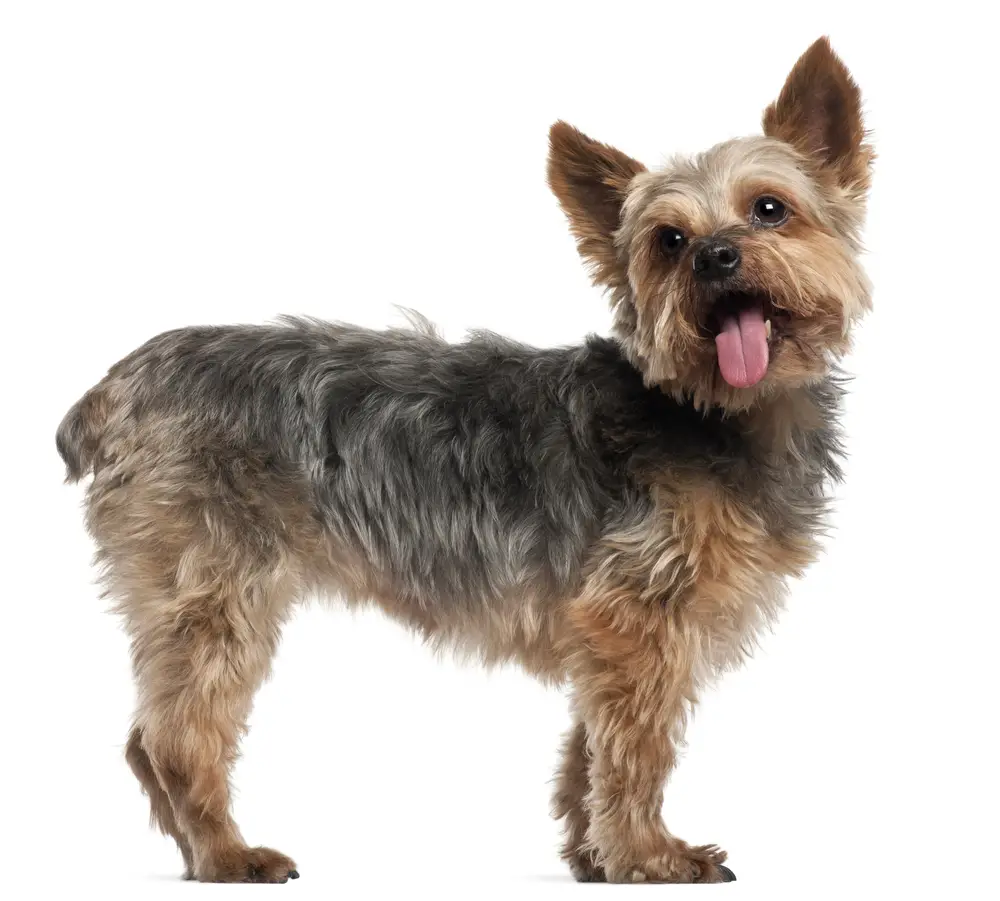Yorkie Puppy Care
Yorkie Puppy Care
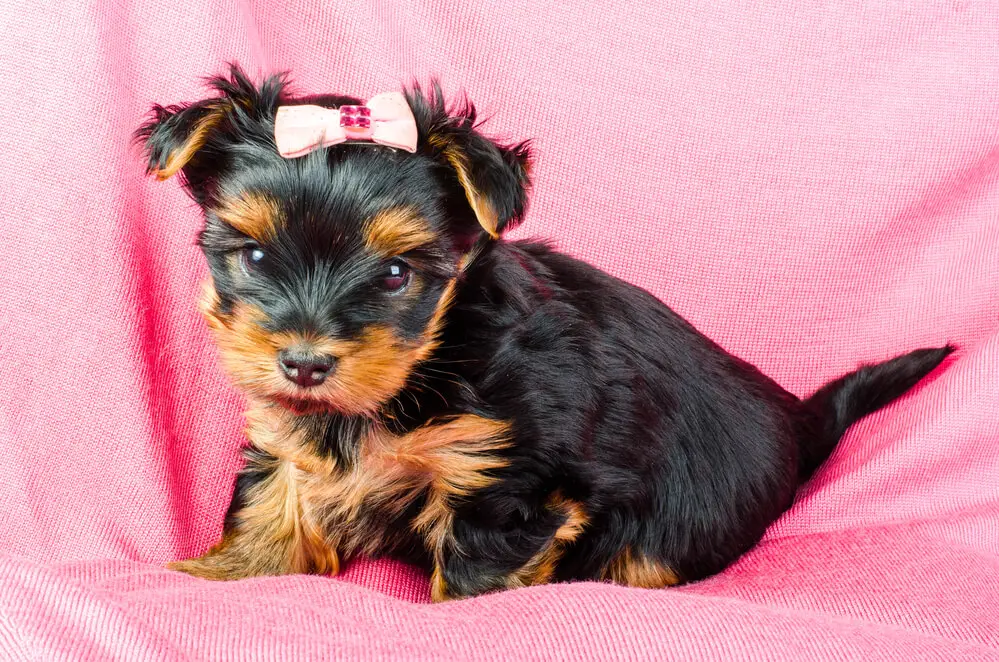 So you’re thinking of buying a Yorkie puppy, or you’ve just brought one home. Well first and foremost, congratulations! Yorkies are full of feisty personality and make great companions. Still, you probably have plenty of questions regarding how best to care for your new Yorkie pup. This comprehensive guide will help you learn how to take care of a Yorkie puppy.
So you’re thinking of buying a Yorkie puppy, or you’ve just brought one home. Well first and foremost, congratulations! Yorkies are full of feisty personality and make great companions. Still, you probably have plenty of questions regarding how best to care for your new Yorkie pup. This comprehensive guide will help you learn how to take care of a Yorkie puppy.
As a quick note, if you are yet to purchase a Yorkie, bear in mind that you shouldn’t be bringing home a Yorkie pup that’s under the age of 8 weeks. In many states and cities, selling puppies under 8 weeks old is illegal. Even when it isn’t, it should be avoided as an 8 week old Yorkie still needs its mom.
Yorkie Growth Stages
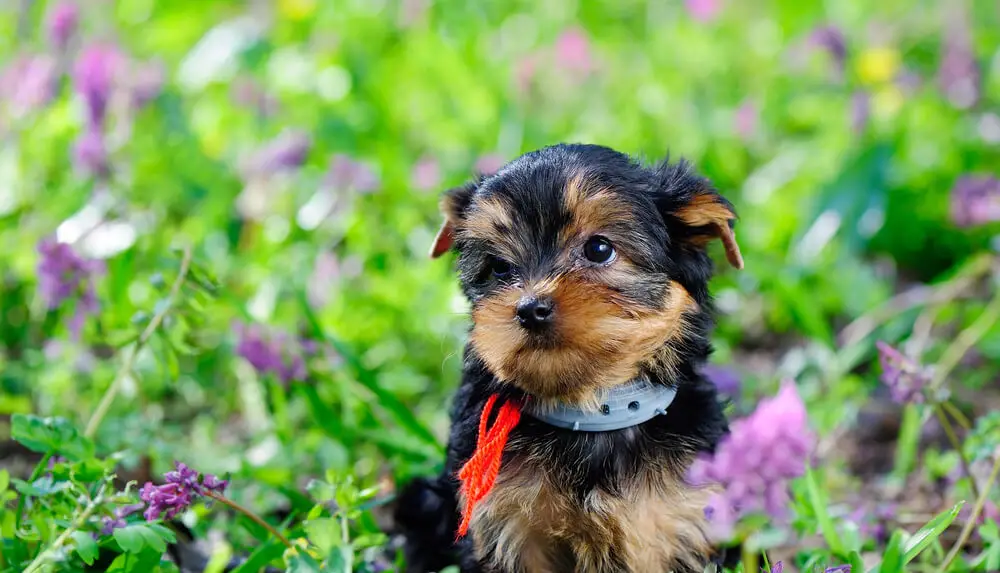 During the first two weeks of a Yorkie’s life, its greatest bond will be that which it shares with its mother. Over the next 2 weeks, his brothers and sisters will become more of an influence, the senses of smell and hearing will increase, and the Yorkie’s eyes will finally open. By 5 weeks of age, we start to see walking and barking. An 8 week old Yorkie puppy will be ready to be separated from his mother and siblings.
During the first two weeks of a Yorkie’s life, its greatest bond will be that which it shares with its mother. Over the next 2 weeks, his brothers and sisters will become more of an influence, the senses of smell and hearing will increase, and the Yorkie’s eyes will finally open. By 5 weeks of age, we start to see walking and barking. An 8 week old Yorkie puppy will be ready to be separated from his mother and siblings.
Thanks to their small size, Yorkies can quite easily find themselves overwhelmed by intense or loud surroundings. At around 8 to 10 weeks, and again at 16 weeks, baby Yorkie puppies will experience fear that can affect them in permanent ways. When you bring your new Yorkie pup home at 8 weeks until they reach 6 months of age, socialization and training are of the utmost importance. Start by introducing them to new surroundings, new situations, and new experiences, for example car rides, dog parks, and other outdoor activities. You can also begin with consistent obedience training. Make sure your new Yorkie has the chance to mingle with other dogs, and other humans too.
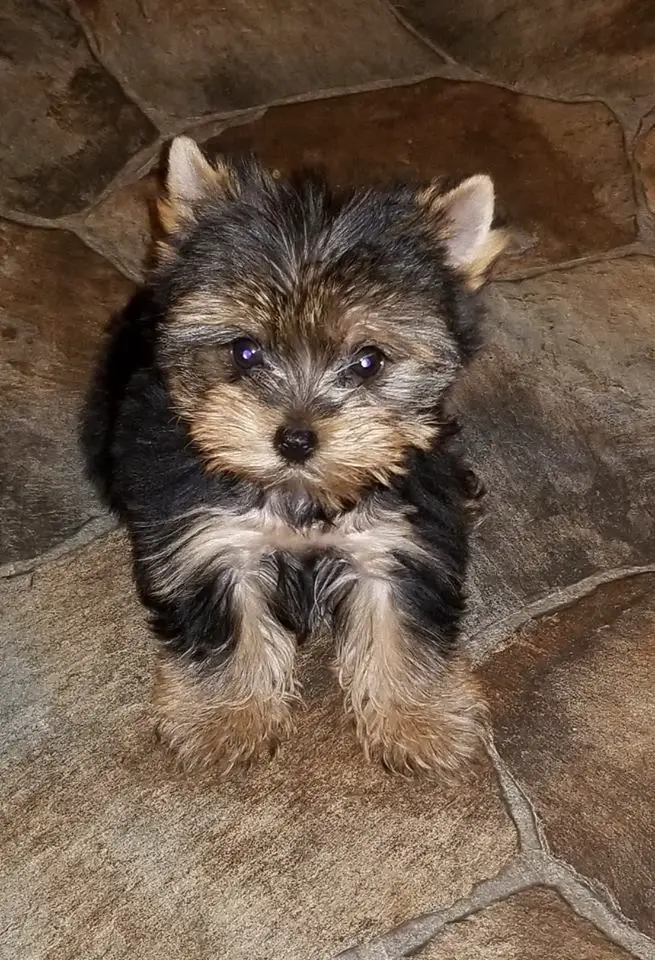
Bossy – Courtesy of Ruth Martin
When reaching adolescence at 6 months to 2 years, your Yorkie will be greatly influenced by yourself and other dogs you may have. If your Yorkie pup hasn’t been neutered or spayed, you’ll start to see increased signs of sexual behaviour, along with shows of independence and dominance. Around the age of 2 to 3 years old is when Yorkshire Terriers reach adulthood, and while training will always be important, the personality of your Yorkie will start to become resistant to change.
Despite many living to the ripe old age of 20, Yorkshire Terriers start to show signs of seniority around the age of 12. You may notice a general decline in the time it takes your Yorkie to do things, and may take slightly longer for them to get up. There are many dog formulas made specifically for older dogs, incorporating supplements to aid with sore joints and arthritis. You’ll want to switch over to one of these at this time, and speak to your vet about any dietary changes you might to make to help prolong your Yorkie’s health. At this time you should try to avoid encouraging them to go up and down stairs so much, and perhaps pick them up instead of asking them to jump up to the couch to join you.
Getting the Essentials
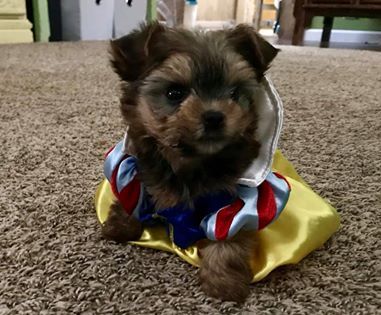
Tiny – Courtesy of Cynthia Merica
Before bringing your new Yorkie puppy home, you’ll want to stock up on the essentials that will help them feel safe, secure, and happy while protecting your home from accidents. Here’s everything you need as you learn how to care for a Yorkie puppy.
Yorkie Puppy Food
What you choose to feed your Yorkie puppy is one of the greatest influences on their current and future health. Many commercial dog food brands offer very little in the way of proper nutrition, and can be packed with all sorts of preservatives and artificial colours and flavoring. Additives such as these have been shown to have a direct link towards the development of the most common allergies. Also be wary of foods with a high content of corn, soy and grains. Yorkies are known for their sensitive stomachs and risk of genetic disorders which makes proper nutrition even more important.
An important element of Yorkie care is choosing the right kibble and avoiding wet food except as a treat because it doesn’t support good dental health — an important concern with Yorkie puppies.
Merrick Lil’ Plates Grain Free Puppy Kibble is a good choice because it’s made with brown rice, deboned chicken, and no potatoes for a low glycemic index. This formula helps support your Yorkie’s joints and bones as they grow.
You should also have a nutritional supplement on hand like Tomlyn High Calorie Nutritional Gel for Puppies as Yorkies have trouble eating a lot at once but experience digestional problems if they don’t eat often enough. Nutritional gel is most important for miniature Yorkie puppies who may have more serious health risks.
Snacks are an important part of your Yorkie pup’s diet too. Be sure to find 100% natural treats, free from all additives, preservatives, by-products, fillers or generic oils and meats. NatureVet VitaPet Puppy Vitamins are a good treat to make sure your new Yorkie puppy gets enough vitamins and minerals during snack time. We also love Nature Balance Limited Ingredient Treats when you’re ready to start potty training your new Yorkie.
It’s recommended that you feed your Yorkie pup 3 small meals per day and 3 to 4 small snacks in between to keep up blood sugar levels. Dry kibble and snacks are recommended, being better for their teeth and to encourage consistent bowel movements. Additionally, get some treats to reserve specifically for rewarding good behaviour. You’ll want to find something moist, and small enough so as not to interfere with your Yorkie’s appetite.
Puppy Toys
In order to avoid a huge pile of mostly ignored toys, you’ll want to find a range that will benefit various needs your Yorkie puppy will have.
Toys for keeping busy
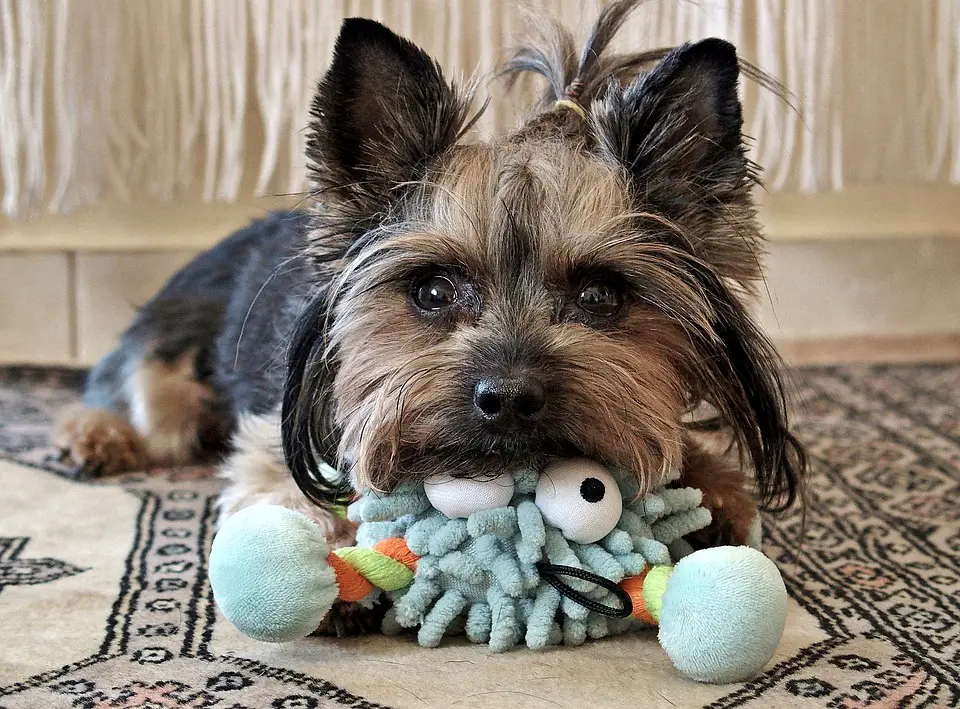 The last thing you want is a bored dog. This leads to unhappiness, and in turn a number of other behavioural issues including stress, destructive behaviour and excessive barking (and remember, your Yorkie will be barking enough as it is). Interactive toys that squeak when bitten will keep your Yorkie focused, especially when you’re too busy to play, or the pup is home alone.
The last thing you want is a bored dog. This leads to unhappiness, and in turn a number of other behavioural issues including stress, destructive behaviour and excessive barking (and remember, your Yorkie will be barking enough as it is). Interactive toys that squeak when bitten will keep your Yorkie focused, especially when you’re too busy to play, or the pup is home alone.
This ZippyPaws interactive squeaky toy is a fun choice because it keeps your Yorkie puppy busy trying to pull the squeaky chipmunks out of the log.
Toys for playing fetch
Attention is something craved by all dogs, and your Yorkie is no exception. Even the world’s most anti-dog human knows the quintessential way to keep a dog entertained is with a game of fetch. Not only will this be a fun experience, but also it will provide both the dog and you with a great bonding session and a nice light session of cardio. You’ll want to find toys that are appropriately sized for such a small dog as a Yorkshire Terrier, and find something nice and colourful to make it attractive. Your own enthusiasm also plays a big role. Keeping excited and animated yourself will bring about more enthusiasm from your Yorkie.
These extra-small fetch balls are a good choice and they come in a large pack for the balls that inevitably get lost.
Toys for teething
For teething, you’ll want to find toys that feature a good consistency while chewed, and are of an appropriate size. Toys made of twisted rope or those with small nubs work great for scratching itchy gums, and finding something flavoured will do wonders at keeping your pup interested.
This Comtim puppy chewer helps ease the pain of teething for your puppy while supporting good dental health.
Toys for companionship
Many dogs can suffer from separation anxiety, especially those that are still puppies and unaccustomed to being alone. Having a toy that can work as a de facto companion can be extremely beneficial in this situation.
Part of Yorkie puppy care is managing separation anxiety. If your puppy has severe separation anxiety, it may be worth trying a more costly toy like this Smart Pet Love snuggle puppy which has a “heartbeat” and heat source so your pup won’t feel alone.
Toys for dispensing treats
These will slowly release treats, and do wonders for keeping your Yorkie pup busy. While the majority of these toys will be designed with larger dogs in mind, there are some ‘Busy Buddy’ toys designed with small dogs, like Yorkshire Terriers, in mind.
We love this IQ treat ball for keeping your puppy busy — especially if you’re going to be leaving the house.
Setting Up Your Yorkie’s Area
You should set your Yorkie pup up with a crate or a playpen like our favorite IRIS pet playpen. This will provide them with a comfortable, open-air defined space, and will assist in the following ways:
- Any potential accidents you would expect when housebreaking your Yorkie will be confined and limited to one area
- It creates a safe, easy spot to contain your Yorkie when you don’t want them roaming the house.
- The teething period can bring with it all kinds of destruction to your furniture. Keeping your pup within a playpen will limit their chewing to the items that are supposed to be chewed.
- Dogs find the idea of a “den,” their own personal space, to be a comforting one. If your pup is suffering from separation anxiety, this will go some way to help, and will also keep all of their items nearby.
You’ll want to keep items such as a good bed, food, water, toys and puppy potty pads within the pen. When choosing a bed, make sure it’s warm and supportive as your new Yorkie needs good joint support. This Deep Dish Snuggler bed is perfect for small dogs that get cold easily like Yorkie puppies.
Grooming Supplies
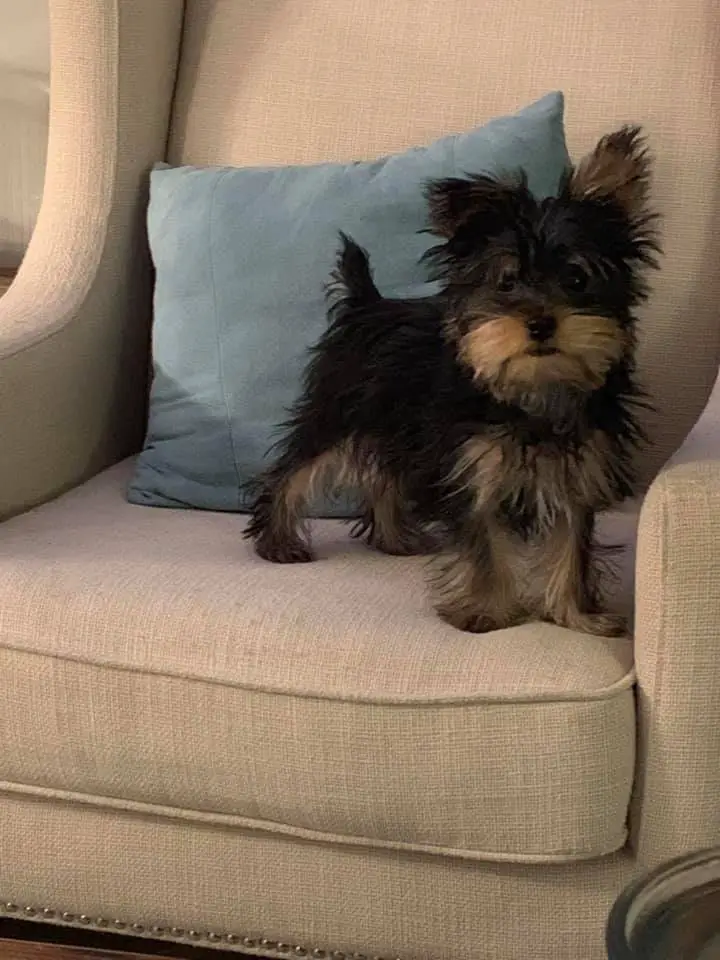
Max – Courtesy of Anna Daniels
When it comes to brushing, Yorkshire Terriers can be fairly low maintenance or very high maintenance depending on their coat length. Yorkies with long coats will require a little more in the way of upkeep. Most importantly, you’ll have to make sure you have the correct brushes. You don’t want to be pulling at hairs or damaging your pup’s coat. If your Yorkie does have a long coat, you’ll want to remember to keep up with routine brushing. This will help remove any debris, get blood flowing to the hair follicles, aid in spreading natural body oils, and help keep matted hair at bay. For Yorkies with short coats, you’ll still be required to keep up the brushing for the same reasons.
While your new Yorkie is still young, they will have the “Yorkie puppy coat” which is soft and easy to maintain. Still, you want to get in the habit of brushing your puppy early in life so they get accustomed to the brush. A basic soft bristle brush is all you’ll need for a 4 month old Yorkie up until they’re a year old or so.
Yorkie Dental Care Items
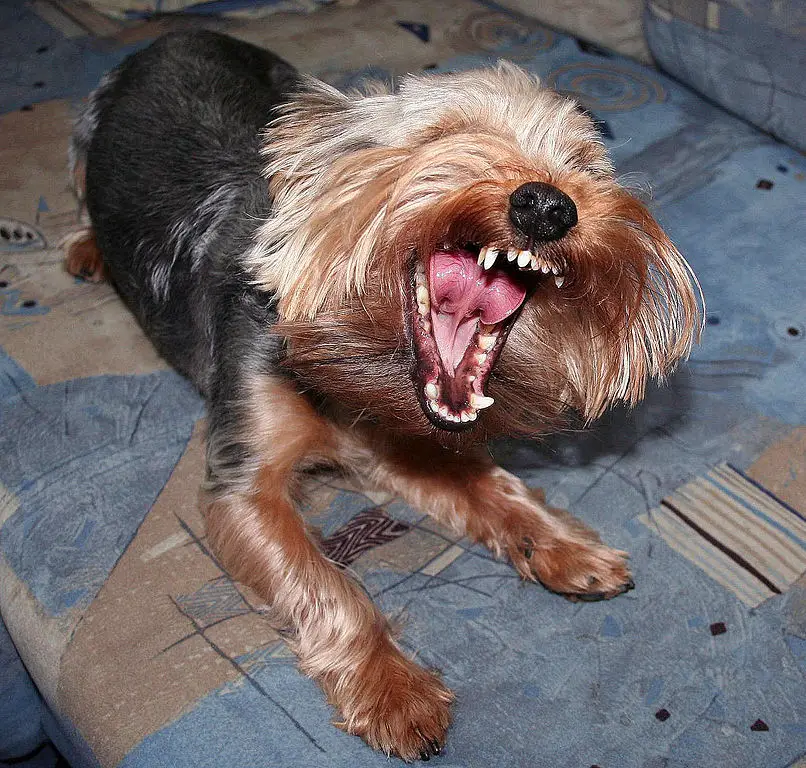 Many are surprised to find that the Yorkshire Terrier is, as a breed, incredibly prone to tooth decay. As young as 5 or 6 years old many Yorkies can experience rot that leads to teeth falling out, along with incredibly bad breath.
Many are surprised to find that the Yorkshire Terrier is, as a breed, incredibly prone to tooth decay. As young as 5 or 6 years old many Yorkies can experience rot that leads to teeth falling out, along with incredibly bad breath.
In order to avoid the build up of plaque, which would lead to all sorts of further problems, you’ll want to brush your Yorkie’s teeth daily, using an appropriately sized canine toothbrush, and a good canine toothpaste like this enzymatic toothpaste. Under no circumstances use human toothpaste; this is toxic and foaming agents can cause your dog to choke.
While brushing daily is the most effective way of keeping your Yorkie’s teeth healthy, the next best option is to use a spray. Many dogs can be resistant to having their teeth brushed, so this will help to remove plaque in this instance. Dental chews like Teeny Greenies are also a great way to help fight tooth decay, along with additives that can be mixed with your pups water that will kill off any unwanted bacteria in the mouth.
Other Basic Puppy Supplies
You may also want to get some or all of the following items:
- Accessories, such as leashes, harnesses, collars and tags. With Yorkies, a soft no-pull harness is very important to use instead of a traditional collar as Yorkies have weak tracheas.
- Body care items, like skin spray, nose balm or paw wax, for example
- Food and water bowls
- A dog car seat
- Warm clothing, such as winter coats and jackets
- First aid items
- Flea and tick repellents
- Shampoo
- Nail clippers
Your New Yorkie Puppy’s First Week at Home
You’ll want to make sure that your bringing your new Yorkie pup home at a time where everything is quiet and peaceful. It’ll be best to avoid having friends or family over, especially overnight.
Before even bringing your pup into the house, take them to a spot outside that you’ve designated as their bathroom and spend a few moments there. If your pup goes then great, make sure to give them praise! If they do not then don’t worry, just bring them into the house and remember to take them to this spot each time they need to go.
The first spot you’ll want to take your Yorkie pup to is their pen. Make sure it has adequate bedding, toys and pee pads. You can leave the door open to allow them to explore the area outside the pen, but make sure that they are supervised at all times when roaming.
Be sure to observe and interact with your puppy as they’re adjusting to their new surroundings. This will help to develop a sense of pack, and ascertain your status as pack leader.
Socializing Your New Yorkie Puppy
For the first few days of bringing your new Yorkie pup home you’ll want to be sure to keep them away from any other pets that you may have. Once your puppy is used to its pen, allow any other pets you may have to enter the room, but be sure to keep the gate shut. Let your pets interact with each other several times over the following days. After this, allow your resident pet access to the puppy’s pen, with your full supervision, and if any trouble arises go back to the previous step.
Veterinary Care for a New Yorkie
Your Yorkie pup should have been given any basic vaccinations necessary prior to your purchase. If you received your puppy for free or it was purchased from a pet shop, it can be assumed that perhaps no shots have been given, and you’ll want to visit a vet. Never assume that your puppies have been adequately vaccinated without records.
It is extremely important that your pup gets all of the following shots in order to prevent them from contracting potentially fatal diseases. Until they’ve been fully vaccinated, you should not take them for walks or to any area in which other dogs may have been. Regardless, you’ll want to take your puppy to the vet as soon as possible for a check over. The typical schedule for puppy vaccinations is as follows:
- 8 week old Yorkie – 1st DHLPP + Corona
- 2 month old Yorkie – 2nd DHLPP + Corona
- 4 month old Yorkie – 3rd DHLPP + Corona
- 16+ weeks – Rabies
When to Give a Puppy the First Bath
An 8 week old Yorkie will be ready for a big milestone: their first bath. Make sure to brush them thoroughly first before bathing them in the sink in about 4 inches of lukewarm water. Scoop a cup of water from the sink and, starting from the back of the head, work your way down your Yorkie pup’s back until the whole body is wet. Avoid getting water in the eyes or ears.
You’ll want to make sure to get your hands on a good quality shampoo. It’s important to find one with a pH balance between 6.5 and 7.5 with no soaping agents, no synthetic dyes and no parabens. Earthbath All Natural Pet Shampoo is a good choice.
While your Yorkie has their short puppy coat, you’ll want to bathe them probably once every three weeks or so. For long haired Yorkies, you’ll want to bathe them weekly.

